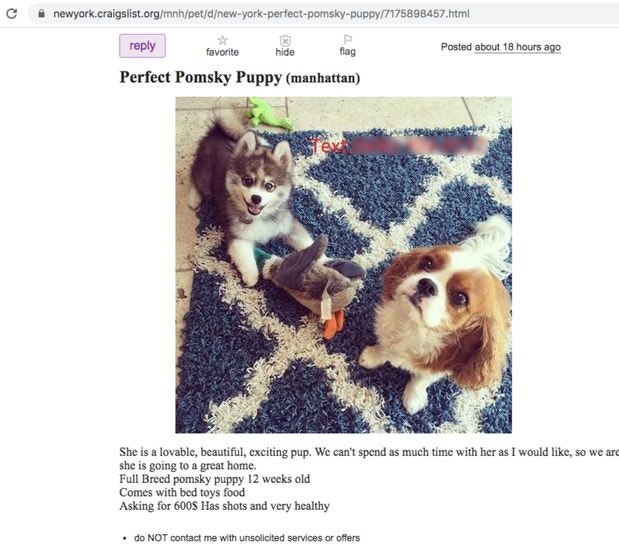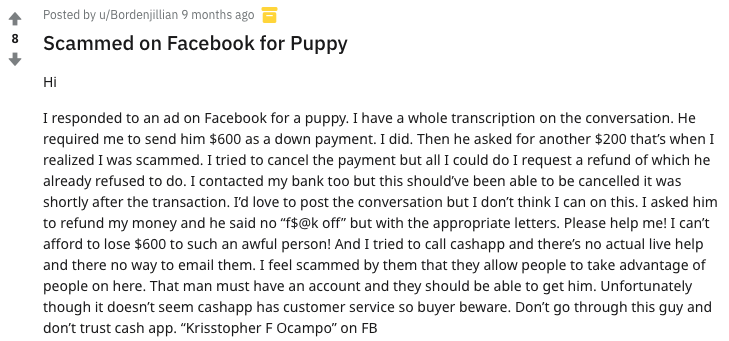- What's the Cash App Pet Deposit Scam?
- Red Flags of the Cash App Pet Deposit Scam
- How to Beat the Cash App Pet Deposit Scam
- Have You Fallen For This Scam?
- Frequently Asked Questions
Adding a furry friend to the family should be a happy occasion. Still, many people using the internet to find the perfect puppy or kitten could unexpectedly and unfortunately find themselves involved in a Cash App pet deposit scam.
What's the Cash App Pet Deposit Scam?
This scam is a twist on a popular bait-and-switch scheme, but it plays particularly on the heartstrings.
It involves a scammer posing as a breeder, creating posts on popular sites like Craigslist to advertise the birth of a new batch of puppies or kittens. They’ll ask for a deposit to secure your spot as a prospective pet parent, but when it’s all over, the animal never appears—and your money is gone, too.
You Find a Pet to Buy Online
Your first interaction with the scammer is when you express interest in the pet they have for sale. The ad could be on any platform, such as Craigslist, eBay, or Facebook Marketplace.
In a Cash App deposit scam, the pets will most likely be advertised as well-bred. This means the scammer can make the litter seem more desirable—making the need for a deposit more pressing—and can also get away with charging a higher price for the pet.
The Seller Asks for a Deposit via Cash App
Almost immediately after you make contact, the seller will be pushy and ask for a deposit before you even get to meet the pet. This could be because of “how desirable” the litter is or may be played off as how the seller does business.
But if you’re asked to transfer money without first seeing the puppy or kitten for yourself (or even through a video call), it’s a tell-tale sign of a Cash App pet deposit scam.
The crux of this scam is when the seller directs you to use Cash App to put the money down.
Example Message from ScammerThe puppies are very high in demand so I will need a deposit of $500 so we can hold one for you. We will only accept Cash App for payment. Once you transfer this to me we can arrange a time for you to pick up the puppy or we can organize shipment.
While the program makes transferring cash easy, it makes getting that money back in case of fraud nearly impossible. Scammers understand this, which is why they will ask you to the app when asking for a deposit.
The “Seller” Disappears
Once they have your money, you’re unlikely to ever hear from them again. Their account may disappear, or they may stop returning your calls or messages, but, unfortunately, at this point, there’s little you can do.
Red Flags of the Cash App Pet Deposit Scam
As is the case with most scams, the best offense is a good defense. Keeping an eye out for red flags—and trusting your gut if something seems off—are the best way to avoid a would-be Cash App pet deposit scam.
Common signs of this scam include:
- Vague information from the seller, including on:
- When or where the animals were born
- The parentage of the animals
- When you can pick your animal up
- No pictures, or stock pictures, used in the ad
- Bad grammar or strange turns of phrase in the post
- A breeder who lives far away or out of town
- The same ad posted on sites for several different cities, states, or regions
- A price that seems too good to be true
- A story about why you won’t be able to see or visit the animal before placing a deposit
- A story about why the breeder will need your money before you see the animal

The second someone asks for payment before you actually get to see the pet, you should start looking elsewhere. If you transfer money via Cash App to a seller before you have or even see the pet that's advertised, they can take off with the money, and you won't have any protection from Cash App.
How to Beat the Cash App Pet Deposit Scam
Some surefire ways to beating a Cash App deposit scam include:
- Not using Cash App (or Venmo, or any other app that doesn’t give you refunds) when doing online business
- Never paying a deposit before seeing the actual animal
No Protection Offered From Cash App
Cash App does not offer any protection against fraudulent transactions, so it's best to stay away from this app when buying things from private sellers. If a seller insists on Cash App and won't accept any other form of payment, it's likely a scam.
Protect Yourself from the Cash App Pet Deposit Scam
If you’re suspicious of the person you’re talking to, you can start fleshing out the situation by:
- Asking for details about:
- Breeding in general, to test their “breeder” knowledge
- The animals, in particular, to check for inconsistencies between what they say and what was in the ad
- Asking for additional pictures of the animals
- Asking to visit the animal in person before deciding to buy it
- If this isn’t possible due to distance, ask to video chat with the person
- Researching the breeder (if the person says they are one)
- Checking any documents
- Well-bred pets typically come with vaccination, microchip, and vet history
- Doing a reverse image search on any photos
Again, beating this scam relies on some combination of instincts and observation. If you feel something is off, you should simply not deal with the person in question.
Have You Fallen For This Scam?
Once you’ve made the payment on Cash App, there’s, unfortunately, little you can do to get your money back. That’s why it’s a crucial part of this scam to convince you to use the app to make a payment.
If you are a victim of a Cash App deposit scam, you should:
- Contact Cash App customer support to let them know about the incident
- They may remove the user from using their platform
- Flag the post on whichever website was advertising it
- Report the poster with whichever website they were using
- File a report with PetScams.com
Depending on how much money you lost, you may also want to consider contacting your local police or other authorities. Again, a definitive result is unlikely in such a case but possible.
Above all, try not to get the emotions involved in pet-searching to get the best of you. Treat it like you would any other online transaction—with a healthy amount of skepticism.


Comments